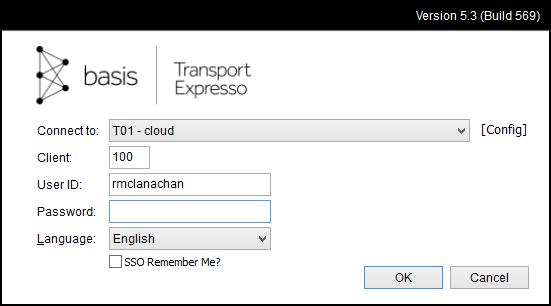The Transport Expresso front-end is a Windows application that is installed on the local PC typically in:
C:\Program Files\Basis Technologies\Transport Expresso
The TE.exe must be run from here but can also be accessed via shortcut pointing to installed location.
To login to Transport Expresso you will require a valid user ID and password in the TE domain controller system. Starting Transport Expresso will present the following login screen:
Select the TE domain controller system and client.
Enter your User ID and password for the TE domain controller and click on the OK button.
TE uses the saplogon.ini files on the local PC to determine this list of systems to connect to. In order to understand where TE looks for the files click on [Config] and it will show all the places on the PC where TE has detected a saplogon.ini file:
This is based on:
1. Environment Variable SAPLOGON_INI_FILE
2. Windows Registry:
- Current User Local: HKEY_CURRENT_USER\Software\SAP\SAPLogon\ConfigFilesLastUsed\ConnectionConfigFile
- Current User Server: HKEY_CURRENT_USER\Software\SAP\SAPLogon\ConfigFilesLastUsed\ConnectionConfigFileOnServer
- Local Machine Local: HKEY_LOCAL_MACHINE\Software\SAP\SAPLogon\ConfigFilesLastUsed\ConnectionConfigFile
- Local Machine Server: HKEY_LOCAL_MACHINE\Software\SAP\SAPLogon\ConfigFilesLastUsed\ConnectionConfigFileOnServer
3. C:\Windows directory
4. Local to where the TE.exe is being run from
5. Command line parameter SAPLOGON_INI_FILE specified when TE is executed.
E.g. “C:\Program Files\Basis Technologies\Transport Expresso\TE.exe” “SAPLOGON_INI_FILE=C:\Windows\saplogon.ini”
The local config files will be used in preference to the server ones but you can select the required file and set it as default if required. TE will then remember this the next time you login.





Post your comment on this topic.